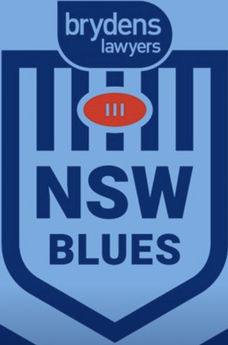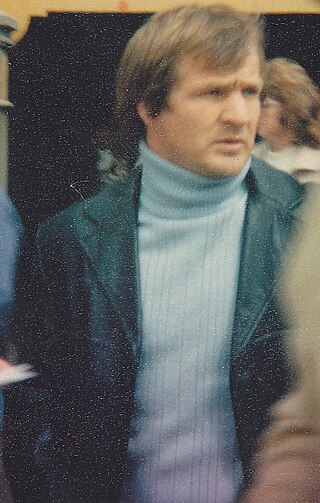
The State of Origin series is an annual best-of-three rugby league series between two Australian state representative sides, the New South Wales Blues and the Queensland Maroons.
State of Origin results and statistics have been accumulating since the 1980 State of Origin game. Every game played under State of Origin selection rules, including the additional 1987 exhibition match and the matches played between New South Wales and Queensland for the Super League Tri-series are detailed below unless stated otherwise.

The New South Wales rugby league team has represented the Australian state of New South Wales in rugby league football since the sport's beginnings there in 1907. Also known as the Blues due to their sky blue jerseys. This annual event is a series of three games competing for the State of Origin shield. As of 2023, the team is coached by Michael Maguire and captained by James Tedesco.

Thomas Walter Raudonikis was an Australian rugby league footballer and coach. He played 40 International games and World Cup games as Australia representative halfback and captained his country in two matches of the 1973 Kangaroo tour.

The Queensland rugby league team represents the Australian state of Queensland in rugby league football. Nicknamed the "Maroons" after the colour of their jersey, they play three times a year against arch-rivals New South Wales in the State of Origin series. The team is currently coached by Billy Slater and captained by Daly Cherry-Evans, and is administered by the Queensland Rugby League. They play all of their home matches at Brisbane's Lang Park.
The 1997 Australian Rugby League season was the 90th season of professional rugby league football in Australia, and the third season run by the Australian Rugby League. While several clubs had left the League to compete in the 1997 Super League season, twelve ARL-loyal teams – eight from across Sydney, two from greater New South Wales and two from Queensland – competed for the Optus Cup Trophy. The top seven teams then played a series of knock-out finals which culminated in a September grand final played in Sydney between the Manly-Warringah Sea Eagles and the Newcastle Knights. The fairytale came true for thousands of Novocastrians when the Newcastle club won their first ever premiership, staging a comeback from 8–16 to shatter Manly's hopes.
The 2007 State of Origin series was the 26th year that the annual best-of-three series of interstate rugby league football matches between the Queensland and New South Wales representative teams was contested entirely under 'state of origin' selection rules. Queensland won the series by winning the first two games. New South Wales avoided the whitewash by winning the third match held at Suncorp Stadium. The Wally Lewis Medal for player of the series was awarded to Queensland's hooker, Cameron Smith.
The 1998 State of Origin series saw the 17th time that the annual three-game series between the Queensland and New South Wales representative rugby league football teams was contested entirely under 'state of origin' selection rules. The return of Super League-aligned stars to Origin following the end of the game's crippling civil war meant the stampeding Brisbane Broncos players were back - to the chagrin of the Blues. The series was notable for being the first in which no team won a game at home.
The 1995 State of Origin series was the 14th annual three-game series between the Queensland and New South Wales representative rugby league teams. Due to the Australian Rugby League's ongoing conflicts with Super League, they ruled that no Super League-aligned players were eligible for State of Origin selection in 1995. This appeared to hurt Queensland, eliminating their mostly Brisbane Broncos back line, and they were not widely expected to win the series. However, they won 3–0, their first series win since 1991. Novice Queensland coach Paul Vautin made only one player change to his squad during the three game series. This series once again saw State of Origin football venture to Melbourne, after an enthusiastic Melbourne crowd packed the MCG to watch game two of the 1994 series. Although the crowd in Melbourne was not as high as 1994's then-record origin crowd of 87,161, it was still a success, attracting 52,994 spectators and furthering the case for a first grade team in Melbourne.
The 1993 State of Origin series was the 12th year that the annual best-of-three series of rugby league football matches between the Queensland and New South Wales representative teams was contested under 'state of origin' selection rules. Queensland's favourite son Wally Lewis returned as coach just two years after his retirement as a player.
The 1992 State of Origin series saw the 11th time that the annual three-game series between the New South Wales and Queensland representative rugby league football teams was contested entirely under "state of origin" selection rules. It was the first year of involvement by New South Wales' most successful coach Phil Gould, who made only four player changes to the Blues squad during the series - one of these necessitated by the return from injury of champion play-maker Ricky Stuart. For the first time in thirteen years of Origin there was no involvement by Wally Lewis to inspire Queensland.
The 1991 State of Origin series saw the tenth time the annual three-match State of Origin series between the New South Wales and Queensland representative rugby league teams was played entirely under 'state of origin' selection rules. It was notable as Wally Lewis' farewell from Origin football and featured his half-time stoush with Mark Geyer in Game II which match culminated in Michael O'Connor's sensational match-winning sideline conversion in teeming rain.
The 1990 State of Origin series saw the ninth time that the annual three-game series between New South Wales and Queensland representative rugby league football teams was contested entirely under "state of origin" selection rules. It was the first year that the Australian Rugby League took an Origin match to Melbourne to showcase the code in Victoria. New South Wales broke an eight-game losing streak in game I and took the series for the first time since 1986.
The 1987 State of Origin series saw the sixth time the annual three-match series between the New South Wales and Queensland representative rugby league football teams was contested entirely under 'State of Origin' selection rules. It saw the emergence of new faces who would go on to become Origin legends, record crowds for all three matches, and an additional exhibition game played in Long Beach, California.
The 2008 State of Origin series was the 27th year that the annual best-of-three series of interstate rugby league football matches between the Queensland and New South Wales representative teams was contested entirely under 'state of origin' selection rules. At its commencement each side had won twelve Origin series with two series drawn.

The 2009 State of Origin series was the 28th time that the annual three-game series between the Queensland and New South Wales representative rugby league football teams was played entirely under 'state of origin' selection rules. Queensland won their first two matches to retain the shield and to record 14 series wins, as well as the first time in Origin history that a state had won the series for four consecutive years. Maroon centre Greg Inglis was awarded the Wally Lewis Medal as player of the series.
The 2010 State of Origin series was the 29th annual best-of-three series of interstate rugby league football matches between the Queensland and New South Wales representative teams played entirely under 'state of origin' selection rules. For the second year in a row, a Queensland victory set a new record for consecutive State of Origin titles, reaching five. Queensland won all three matches, completing their first series white-wash since 1995.
The 2011 State of Origin series was the 30th annual best-of-three series of interstate rugby league football matches between the Queensland and New South Wales representative teams contested under "State of Origin" selection rules. For the third successive year a Queensland victory set a new record for consecutive State of Origin titles, reaching six. Game I was played in Brisbane, Game II in Sydney and Game III was again played in Brisbane. Game III was also Australia's most watched sports TV programme for the year 2011.
The 2012 State of Origin series was the 31st time the annual best-of-three series between the Queensland and New South Wales rugby league teams was played entirely under 'state of origin' rules. For the fourth successive year a Queensland victory set a new record for consecutive State of Origin titles, reaching seven. Game I was played at Melbourne's sold out Etihad Stadium and won by Queensland; its television broadcast watched by more than 2.5 million viewers, rating it as the most-watched State of Origin broadcast since the introduction of OzTAM ratings in 1999. New South Wales' series-equalling win in Game II, played at Sydney's sold out ANZ Stadium, set a new TV ratings record for most-watched second game of any series in State of Origin history. The decider, Game III was played at Brisbane's Suncorp Stadium and was won by Queensland. This game set a new record for the highest television audience in Australia for a rugby league match since the introduction of the OzTam ratings system in 2001.

The 2014 State of Origin series was the 33rd time the annual best-of-three series between the Queensland and New South Wales rugby league teams has been played entirely under 'state of origin' rules. It is the second series to be administered by the Australian Rugby League Commission which was created in a major restructure of the sport's administration in Australia.





